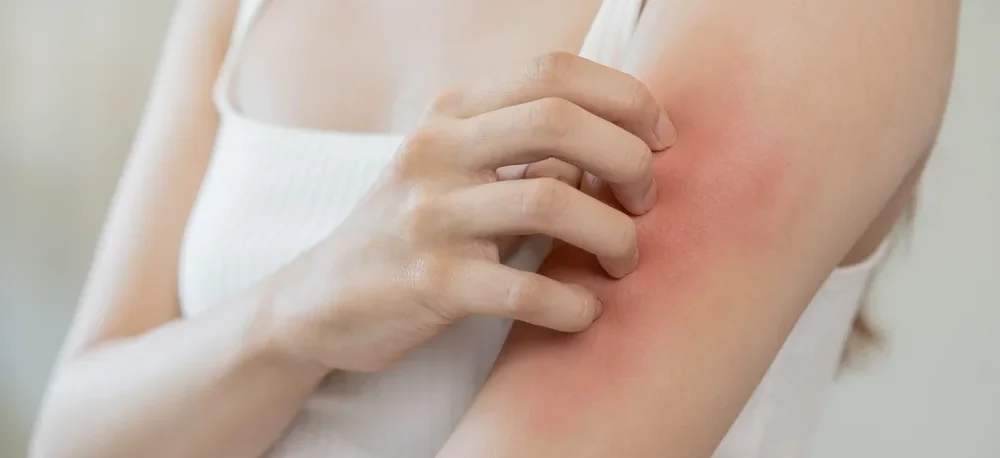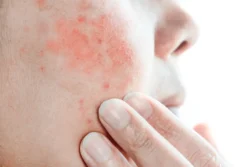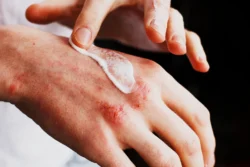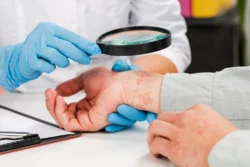
What is Eczema? A Simple Guide to Symptoms, Causes, and Treatment
Eczema is a skin condition that causes dryness, itching, and sometimes redness or swelling. It’s not just regular dry skin. It can be really uncomfortable and even affect your daily life.
It can happen to anyone, no matter your age. Many people first notice it in childhood, but it can also show up later. You’re definitely not alone since millions of people around the world deal with it.
The more you know about eczema, the easier it is to spot the signs, take care of your skin, and avoid things that might make it worse. Whether you have it yourself or you’re supporting someone who does, understanding eczema can make a big difference in how you manage it every day.
What is Eczema?
Eczema is a common skin condition that makes your skin feel dry, itchy, and irritated. It’s not just a one-time rash. It often comes and goes, and many people need to care for it regularly.
When you have eczema, your skin has a harder time holding in moisture. That makes it easier for things like soaps, dust, or even changes in the weather to bother your skin. Because of this, your skin might get red, rough, flaky, or even crack.
Some of the most common signs of eczema include:
- Itchy skin, which can be mild or really intense
- Red or swollen patches
- Dry or rough areas, especially on the hands, face, or behind the knees
- Flaky or scaly spots
- Sometimes, small blisters that may leak fluid
Eczema shows up differently for everyone. You might have times when your skin gets worse. These are called flare-ups, and they’re often followed by times when your skin feels more normal again.
Types of Eczema
Eczema isn’t just one single skin issu
e. It’s actually a group of related conditions that cause irritation, dryness, or inflammation. Even though they all fall under the same name, each type has its own triggers and symptoms. Here’s a look at the most common types and what makes them different.
Atopic Dermatitis
This is the type most people think of when they hear “eczema.” It often starts in childhood and can run in families. The skin gets really dry and itchy, and flare-ups can cause redness, cracking, or even bleeding. People with this kind of eczema often also deal with asthma or seasonal allergies.
Contact Dermatitis
This happens when your skin touches something that doesn’t agree with it, like soap, cleaning products, or certain plants. It can show up as a red, itchy rash and might blister in some cases. There are two main types: allergic (like a reaction to nickel or latex) and irritant (from repeated contact with harsh stuff, like detergents or hand sanitizer).
Dyshidrotic Eczema
This one mostly affects your hands and feet. It causes small, itchy blisters that can be really uncomfortable. Things like stress, sweating, or allergies can set it off. Once the blisters clear up, the skin might peel or crack.
Nummular Eczema
Also known as discoid eczema, this type causes round, coin-shaped spots on your skin. They’re usually very itchy, dry, and scaly. It can be triggered by things like cold weather, skin injuries, or sensitivity to fabrics or soaps.
Seborrheic Dermatitis
This type tends to show up in areas that get oily, like your scalp, face, or chest. It causes red, flaky patches and dandruff. In babies, it’s often called a cradle cap. Experts aren’t totally sure what causes it, but it may have something to do with yeast on the skin or how your immune system reacts to it.
Stasis Dermatitis
This usually happens in the lower legs, especially in people with poor circulation or varicose veins. The skin can become swollen, itchy, and discolored. If it’s not taken care of, open sores can form.
Each type of eczema comes with its own challenges. But with the right care, treatments, and support, it’s possible to manage your symptoms and feel more comfortable in your skin.

What Causes Eczema?
Eczema doesn’t have just one cause. It usually happens because of a mix of things going on inside your body and around you. Here’s a closer look at some of the main reasons people get eczema:
Genetics and Family History
Eczema often runs in families. If your parents or siblings have eczema, asthma, or allergies, you’re more likely to have it too. Certain genes can affect how strong your skin is and how well it holds moisture.
Immune System Overreaction
If you have eczema, your immune system might respond too strongly to things that aren’t usually a problem, like dust or sweat. This can cause your skin to get red, itchy, and inflamed.
Environmental Triggers
Everyday things in your surroundings can bring on eczema symptoms. Common triggers include:
- Harsh soaps or detergents
- Fragrances in skincare or laundry products
- Pollen, dust mites, or pet dander
- Changes in weather or humidity
- Air pollution
Everyone reacts differently, so what bothers one person’s skin might not affect someone else.
Lifestyle Factors
Stress can make a big difference. Feeling anxious or overwhelmed can lead to flare-ups. Diet may also play a role for some people. While no single food causes eczema for everyone, certain foods like dairy, gluten, or nuts might trigger symptoms in some individuals.
The more you understand what affects your skin, the easier it becomes to manage eczema and reduce flare-ups over time.
Symptoms of Eczema
Eczema doesn’t always look the same for everyone, but there are some signs that show up pretty often.
Common Signs to Watch For
- Itchy skin – This is usually the first thing people notice. It can be mild or really uncomfortable, and it often feels worse at night.
- Dry or scaly skin – The skin may feel rough, cracked, or flaky, kind of like it’s peeling.
- Red or inflamed patches – These can appear anywhere and usually look swollen or irritated.
- Blisters or oozing – During flare-ups, small blisters might form and sometimes leak fluid.
- Thickened or leathery skin – If the area gets scratched a lot, the skin can become thick, rough, or tough over time.
How Symptoms May Vary by Age or Type
In babies, eczema often appears on the cheeks, scalp, and legs. Their skin may look red, feel very dry, and be extra sensitive.
In children, it’s common to see patches in the folds of the elbows or knees. It can also show up on the wrists, ankles, or hands.
In adults, symptoms may cover more areas of the body. The skin can be very dry and itchy, and flare-ups might last longer.
Different types of eczema have their own signs, too. For example:
- Dyshidrotic eczema causes small, itchy blisters on the hands and feet.
- Seborrheic dermatitis often causes greasy, scaly patches on the scalp or face.
When Symptoms Usually Appear
Eczema often starts in infancy or childhood, but it can also develop later in life. For many people, the symptoms come and go. You might go for a while without any issues, and then suddenly have a flare-up.
Paying attention to the signs and how they change can help you get the right care and feel more in control of your skin.
Who Gets Eczema?
Eczema can affect anyone, no matter their age. It’s a common skin condition that shows up differently depending on where you are in life. Some people only have it for a while and grow out of it. Others might deal with it now and then for years.
Infants and Children
Eczema often starts when kids are very young. Babies might get dry, red, or itchy spots, usually on their cheeks, scalp, or legs. For some, it goes away as they grow. But for others, it can continue into their school years or longer. Kids with eczema often scratch the itchy spots, which can make the skin sore or lead to infections if it isn’t treated.
Adults and Seniors
Eczema isn’t just something kids get. Adults can have it too, even if they didn’t have it as children. In adults, it’s more likely to show up on the hands, face, neck, or legs. The skin tends to be drier, and flare-ups can be harder to get rid of. Older adults might deal with eczema more often because their skin becomes thinner and drier with age.
Risk Factors to Watch For
Some things can make it more likely for someone to develop eczema:
- Family history – If eczema, asthma, or allergies run in your family, your chances of having it are higher.
- Sensitive skin – People with naturally dry or sensitive skin often have more trouble with flare-ups.
- Weather – Living in dry or cold places can take a toll on your skin.
- Irritants – Soaps, cleaning products, and other harsh chemicals can bother your skin and trigger eczema.
- Stress and health issues – High stress levels, a weak immune system, or other health conditions can make eczema worse.
Whether eczema starts in childhood or later in life, it’s something that can be managed. Learning what triggers it and how to care for your skin can make a big difference.
How is Eczema Diagnosed?
If you think you or your child might have eczema, the best thing to do is see a doctor. This is usually a dermatologist or your family doctor. They’ll take a good look at your skin, ask you some questions, and help figure out what’s going on. From there, they can recommend the right treatment to help you feel better.
What to Expect During a Doctor’s Visit
At your appointment, the doctor will ask about your symptoms. They’ll want to know when they started, what makes them better or worse, and whether anyone in your family has eczema, allergies, or asthma. They may also ask about your daily routine, such as what skin products you use and whether you’ve been under stress lately.
Skin Examination and Possible Allergy Tests
After the questions, the doctor will closely examine your skin. They’ll check for signs like dryness, redness, or rashes. In most cases, just looking at your skin is enough to make a diagnosis.
If the doctor thinks allergies could be part of the problem, they might suggest allergy tests. These tests can help identify whether things like certain foods, dust, or pet hair are making your eczema worse.
Importance of Early Diagnosis
Finding out early that you have eczema can really help. Once you know what’s causing the irritation, you can begin the right treatment and prevent more serious issues later on. Early care can also reduce flare-ups, lower the chance of infections, and make daily life more comfortable.
If you’ve been dealing with dry, itchy, or inflamed skin that doesn’t go away, it’s a good idea to talk to a doctor. Getting answers is the first step toward feeling better.

Treatment and Management
There’s no single cure for eczema, but the good news is it can be managed with the right care. The goal is to keep your skin calm, moisturized, and protected from anything that might cause a flare-up. It might take a bit of trial and error, but here are some simple and helpful ways to manage eczema day to day:
Moisturizers and Gentle Skincare
Moisturizing is one of the most important steps in managing eczema. Thick creams or ointments usually work best because they lock in moisture and help protect your skin.
- Apply moisturizer right after you bathe, while your skin is still damp
- Choose gentle, fragrance-free products that won’t irritate your skin
- Avoid hot showers and long baths since they can dry out your skin
Prescription Creams and Medications
If regular moisturizers aren’t enough, your doctor might suggest a prescription:
-
Topical steroid creams to ease inflammation and itching during flare-ups
- Non-steroid creams that are better for sensitive spots like your face
- Oral medications like antihistamines or immune-suppressing drugs if your symptoms are more serious
Always use these exactly as your doctor says, and let them know if something isn’t helping or is causing side effects.
Lifestyle Changes
Small changes in your daily routine can go a long way in keeping flare-ups under control:
- Wear soft, breathable fabrics like cotton and avoid rough ones like wool
- Try to reduce stress because feeling anxious or overwhelmed can make eczema worse
- Stay cool in hot weather since heat and sweat often trigger itching
- Pay attention to what sets off your eczema, whether it’s a certain soap, food, or something in the air
Home Remedies and Tips for Relief
Sometimes simple things you can do at home make a big difference:
- Use a cool compress to help calm itchy spots
- Take a lukewarm oatmeal bath to soothe your skin
- Use a humidifier when the air in your home is dry
- Keep your nails short to avoid breaking the skin if you scratch
Everyone’s skin reacts differently, so what works for one person might not work for another. It might take some time to find the right routine, but with gentle care, the right treatments, and a bit of patience, living with eczema gets easier.
Living with Eczema
Living with eczema can be tough sometimes. There are good days and bad days, but with the right care and mindset, you can feel more at ease in your skin. A bit of planning, daily care, and support from others can really help make things more manageable.
How to Manage Flare-Ups
Flare-ups are those times when eczema gets worse. Your skin might feel itchier, redder, or more irritated than usual. It’s frustrating, but there are ways to handle it:
- Use any prescribed creams or medications as soon as you notice a flare-up starting
- Moisturize often, even a few times a day if your skin feels dry
- Try to avoid things that make your eczema worse, like hot water, rough fabrics, or scented soaps
- Wear soft, loose clothing that won’t rub against your skin
- As tempting as it is, try not to scratch. Scratching can make the skin worse and lead to infections
Coping with the Emotional Side of Eczema
Eczema isn’t just about itchy skin. It can affect how you feel about yourself too. You might feel embarrassed about visible patches or tired of dealing with the constant discomfort.
These feelings are completely normal. Talking to someone you trust, like a friend, family member, or therapist, can make a big difference. Joining a support group can also help you feel less alone. Many people go through the same ups and downs. On hard days, be kind to yourself.
Building a Skincare Routine
Having a regular skincare routine can really help keep your skin calmer and more comfortable. Here’s a good place to start:
- Use a gentle, fragrance-free cleanser that won’t dry out your skin
- Moisturize in the morning, before bed, and after showers or baths
- Stick with products made for sensitive skin. Avoid anything with strong scents, alcohol, or dyes
- Keep the routine going even when your skin feels fine. It helps prevent future flare-ups
Finding what works for your skin might take time, but once you do, it becomes part of your daily life, just like brushing your teeth or washing your face. It’s a simple way to support your skin and help it stay healthy.

When to See a Doctor
You can often keep eczema under control with good skincare and a few changes to your daily routine. But sometimes, it’s not enough, and that’s when seeing a doctor can really help.
Signs It’s Time to Get Help
It’s a good idea to check in with a doctor if:
- Your skin is really itchy, red, or sore, and nothing you’re doing at home is helping
- You see yellow crust, swelling, or anything that looks like an infection
- Flare-ups are happening more often or not going away like they used to
- Eczema is messing with your sleep, making it hard to focus, or just getting in the way of your day
- You’re not sure what’s triggering your symptoms
Getting help early can make things a lot easier. You don’t have to wait until it gets worse.
How a Dermatologist Can Help
Dermatologists are skin experts and they understand eczema well. They can:
- Tell you for sure if it’s eczema or something else
- Prescribe stronger creams or treatments if over-the-counter products aren’t working
- Help you figure out what’s causing your flare-ups and suggest ways to manage them
- Offer support if your eczema is linked to allergies, stress, or other health issues
Even if you’ve been dealing with eczema for years, getting expert advice can really change how you feel. You’re not on your own. If you’re looking for guidance, consider reaching out to the team at Palm Beach Dermatology Group. They can help you find relief and feel more confident in your skin.
How to Take Care of Your Skin with Eczema
Eczema is a skin condition that causes dryness, itching, and irritation. It can show up at any age, whether you’re a baby, a child, or an adult, and it looks different for everyone. There isn’t a cure, but with the right care, it’s something you can manage. That might mean using gentle skincare, taking medication, making a few lifestyle changes, and getting advice from a doctor when needed.
If you’re living with eczema, you’re not alone. Some days will be harder than others, and that’s completely normal. But there are ways to soothe your skin and feel more in control. With patience, consistency, and the right support, you can build a routine that helps you feel better and live more comfortably.
FAQs
Is eczema contagious?
No, eczema is not contagious. You can’t catch it from someone else, and you can’t pass it on by touching someone.
Can eczema go away on its own?
In some children, eczema may fade over time. But for many people, it’s a long-term condition that comes and goes. While it might not go away completely, it can be managed well with the right care.
What makes eczema worse?
Triggers vary for everyone, but common ones include stress, weather changes, harsh soaps, certain fabrics, and allergens like dust or pet dander. Keeping track of your triggers can help you avoid flare-ups.
Can diet affect eczema?
For some people, certain foods like dairy, eggs, or gluten may trigger flare-ups. If you think your diet is affecting your skin, it’s best to talk to a doctor before making any big changes.
Is eczema the same as dry skin?
Not exactly. While dry skin is a symptom of eczema, eczema also involves inflammation, itching, and sometimes even rashes or blisters. It needs more than just moisturizer to manage properly.
What is eczema caused by?
Eczema is caused by a mix of things like genetics, an overactive immune system, and triggers from the environment. Common triggers include soaps, allergens, stress, and weather changes. If eczema runs in your family, you might be more likely to have it.
What’s the difference between eczema and psoriasis?
Both conditions cause red, itchy, dry patches, but they’re different. Eczema usually involves more itchiness and may be triggered by allergies or irritants. Psoriasis tends to cause thick, scaly patches and is linked more closely to immune system issues. A dermatologist can help tell the difference.
What does eczema look like?
Eczema can look like red, dry, or scaly patches. It might be rough, cracked, or oozing during a flare-up. On darker skin tones, it may appear brown, purple, or grey instead of red. The look can vary depending on the type of eczema and your skin color.
What is the 3-minute rule for eczema?
This rule means you should apply moisturizer within 3 minutes after bathing. It helps seal in moisture while your skin is still slightly damp, which can reduce dryness and irritation.
What oil is good for eczema?
Natural oils like coconut oil, sunflower seed oil, and jojoba oil can help soothe and hydrate the skin. Just make sure to test a small patch first to make sure it doesn’t cause irritation.
What is eczema on the face?
Facial eczema can show up as dry, red, flaky patches around the cheeks, forehead, or nose. The skin may feel tight or itchy. Because facial skin is delicate, it’s important to use gentle, fragrance-free products.
What is eyelid eczema?
Eyelid eczema causes red, dry, or scaly skin on or around the eyelids. It can be very uncomfortable and sensitive. Avoid eye makeup or scented creams, and talk to a dermatologist for safe treatment options.
What is hand eczema?
Hand eczema causes dry, cracked, or itchy skin on the hands. It often comes from frequent washing or exposure to chemicals and cleaning products. Wearing gloves and using thick hand creams can help protect the skin.
What autoimmune disease is associated with eczema?
While eczema itself isn’t an autoimmune disease, it’s related to an overactive immune response. People with eczema may also have other immune-related conditions like asthma or hay fever. In rare cases, eczema is seen alongside autoimmune issues like thyroid disease.
What is infantile eczema?
Infantile eczema affects babies and usually shows up as red, dry, or itchy patches on the cheeks, scalp, and legs. It can improve as the child grows, though some children continue to have eczema later in life.
What is scalp eczema?
Scalp eczema causes dry, itchy, or flaky skin on the scalp. It can be mistaken for dandruff. Using gentle shampoos and avoiding harsh hair products can help, and a doctor can recommend medicated treatments if needed.
What is the fastest way to heal eczema?
While eczema can’t be “cured,” flare-ups can be calmed with:
- Applying thick moisturizer often
- Using prescription creams as directed
- Avoiding known triggers
- Keeping the skin cool and hydrated
For fast relief, follow your doctor’s treatment plan and stick to a gentle skincare routine.
